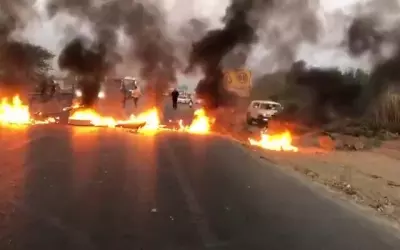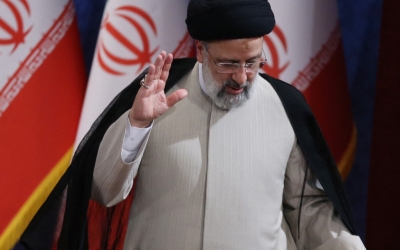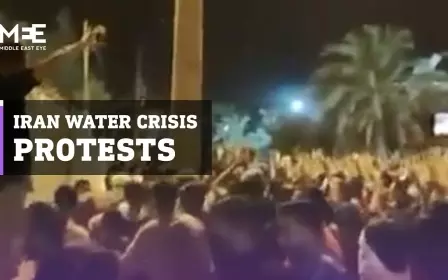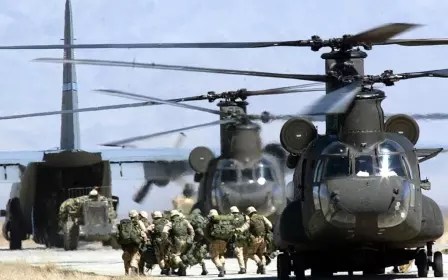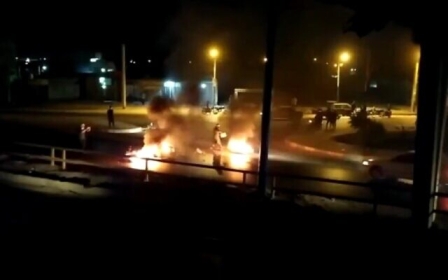Iranian press review: Former presidents condemn crackdown on protests
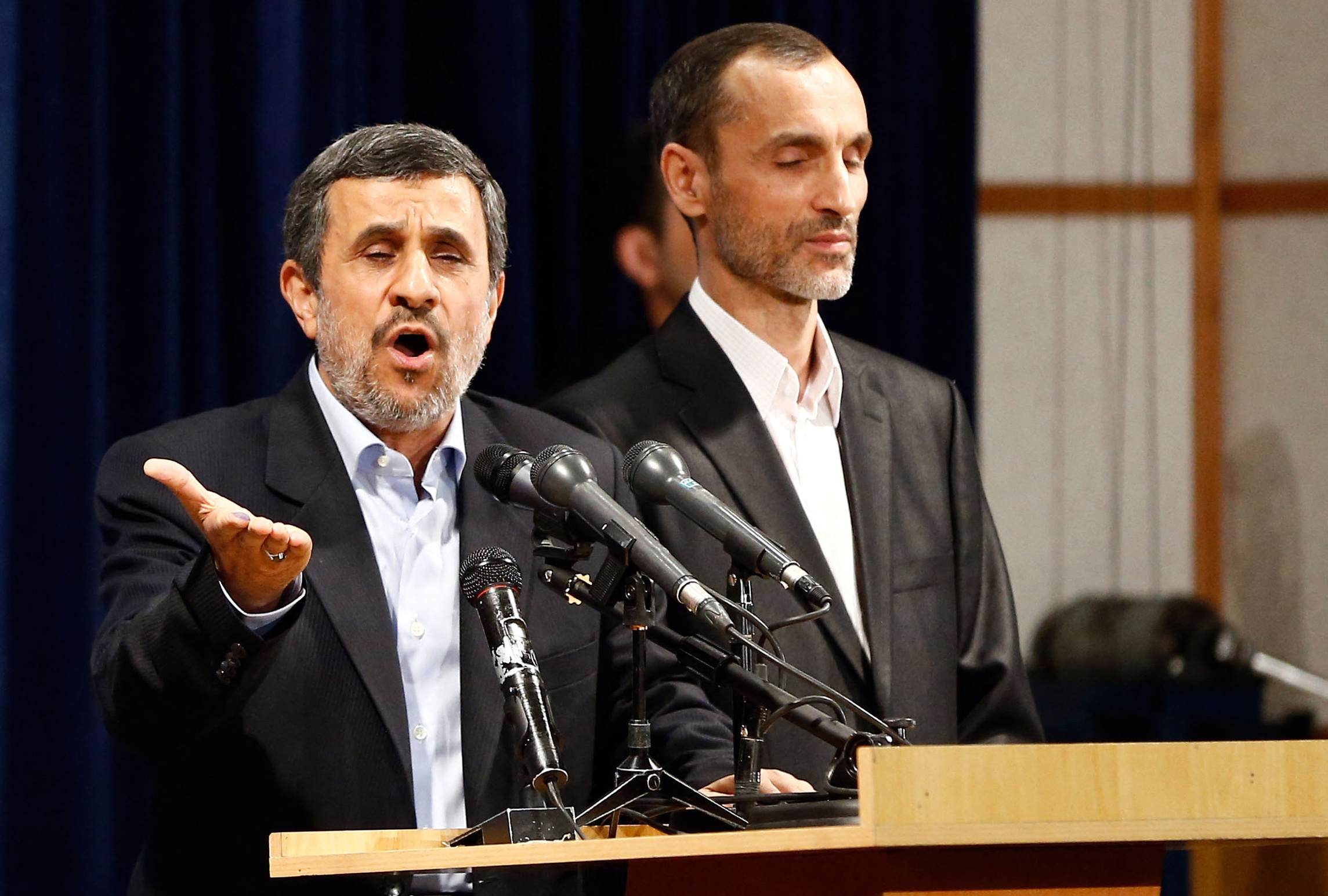
Khatami and Ahmadinejad support Khuzestan protesters
Two former Iranian presidents, Seyyed Mohammad Khatami and Mahmoud Ahmadinejad, lambasted the brutality of the anti-riot forces in cracking down on demonstrations against water shortage in Iran’s Khuzestan province.
The protests in the southeastern oil-rich province began on 16 July in Ahwaz, the provincial capital, before spreading to other cities. According to officials, two civilians and one policeman were killed during the week-long unrest.
'No political, security, military institution or law enforcement has the right to confront people's protests with brutality, guns and bullets, on the pretext of confronting chaos'
- Mohammad Khatami
In support of protesters in Khuzestan, Khatami apologised in a statement for his shortcomings in constructing necessary infrastructure in the province during his time in office between 1997 and 2005.
"I am sorry and ashamed to hear those who live in this province still face difficulties in accessing drinkable water, while the country's biggest rivers pass through it," read the statement.
Khatami highlighted people's rights to demonstrate for their "rightful demands", condemning the attacks on protesters.
"No political, security, military institution or law enforcement has the right to confront people's protests with brutality, guns and bullets, on the pretext of confronting chaos," he wrote.
Khatami, one of the most prominent reformist figures in Iran's political scene, has been barred from public service since he voiced support for the 2009 Green Movement, which rose against what was widely perceived as a rigged presidential election that saw Ahmadinejad win a second term.
Following the house arrest of the Green Movement leaders, the intelligence branch of the Islamic Revolutionary Guard Corps (IRGC) and the judicial system have banned Iranian media from publishing any news regarding Khatami, however, his latest statement was published by a number pro-reformist outlets.
Meanwhile, Ahmadinejad - during whose presidency (2005-13) Iran banned Twitter - criticised the government for police and security forces violence in southeastern cities in a video he posted on Twitter.
"People of Khuzestan have rightfully raised their voices," Ahmadinejad said.
"But, sadly, in our country, a corrupt intelligence group fights against all kinds of demands by people and their peaceful protests," he added, without elaborating on which intelligence group he meant.
Despite Ahmadinejad's stance against the current crackdown in Iran, his tweet backfired due to his role in the brutal suppression of the 2009 movement, when he called the demonstrators "dirt and dust".
"Mahmoud Ahmadinejad, whose rigged election was the main reason of #IranProtests back in 2009, is now pretending to empathise with the people protesting in #Khuzestan in southern Iran," an Iranian user wrote on Twitter.
Health ministry corruption revealed
In a series of investigative articles, the Arman daily has revealed a corruption case in Iran's health ministry regarding the import of special bandages for patients suffering from epidermolysis bullosa (EB), a rare genetic disease.
On 12 June, the daily reported that 2.8 tonnes of the special wound dressing provided by Unicef to Iranian EB patients disappeared after the shipment was handed over to Iran's health ministry.
In May 2020, with financial support from Germany, Unicef shipped 5.8 tonnes of the special product to Iran, which under US sanctions could not be purchased from the Swedish pharmaceutical company, Molnlycke.
The Arman daily discovered that only three tonnes of the products were distributed among the NGOs supporting EB patients, while a large quantity of the bandages surfaced in Tehran's medical black market.
On 10 July, the daily wrote that a five-piece pack of the special bandages from the Swedish company was sold on the black market for 30 to 40 million Iranian rials ($714-$950).
Under the headline: "Mr Namaki, have a look at the black market!", the daily called on the Health Minister Saeed Namaki to control corruption in his ministry.
Arman also added that while health NGOs supporting EB patients had no access to the special bandages, these products were sold in certain pharmacies in Tehran, with the health ministry's hologram and label.
The bandages developed by Molnlycke are the most effective care for blisters and wounds that EB causes. Without these bandages, painful injuries will spread across the body and can result in death.
'Wine well' uncovered
Police uncovered a well used to store bootleg wine in a village near Khorramabad, the capital of the western province of Lorestan, Mehr News reported.
According to Mehr, police raided the site after receiving reports about the production and distribution of alcohol in the village.
The news about the wine bust went viral rapidly on Farsi social media, with many mocking the ban on alcoholic drinks and the heavy presence of police forces at the scene in a video released by the police.
Footage broadcast on TV show police officers using a hose to pump out red wine from the well into a barrel.
"No need to mention anything about the creativity of the guy [who dug the well], but I'm wondering if the police would deploy the same number of officers to arrest the Islamic Republics' thieves and criminals," one Twitter user wrote.
Since the 1979 Islamic revolution in Iran, production, consumption and trade in alcoholic drinks has been illegal and punishable with prison and 80 lashes.
Despite the official ban, alcoholism is a severe social issue in the country, and every year the Iranian police seize tonnes of illicit alcoholic beverages.
In separate news, local media reported that police confiscated 6,000 litres of moonshine in the northern city of Babol. At the same time, in the capital Tehran, bottles of mineral water filled with traditional Iranian liquor, known as Aragh Sagi, were recovered.
The police do not provide precise statistics about the exact quantity of alcohol seized annually in Iran.
* Iranian press review is a digest of reports that are not independently verified as accurate by Middle East Eye.
Middle East Eye propose une couverture et une analyse indépendantes et incomparables du Moyen-Orient, de l’Afrique du Nord et d’autres régions du monde. Pour en savoir plus sur la reprise de ce contenu et les frais qui s’appliquent, veuillez remplir ce formulaire [en anglais]. Pour en savoir plus sur MEE, cliquez ici [en anglais].


